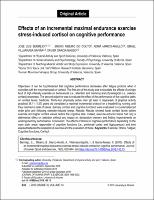| dc.contributor | Vall d'Hebron Barcelona Hospital Campus |
| dc.contributor.author | Bermejo, Jose Luis |
| dc.contributor.author | Ribeiro do Couto, Bruno |
| dc.contributor.author | Marco Ahulló, Adria |
| dc.contributor.author | Villarrasa-Sapiña, Israel |
| dc.contributor.author | García-Massó, Xavier |
| dc.date.accessioned | 2020-07-06T12:10:04Z |
| dc.date.available | 2020-07-06T12:10:04Z |
| dc.date.issued | 2019-09-02 |
| dc.identifier.citation | Bermejo JL, Ribeiro do Couto B, Marco-Ahulló A, Villarrasa-Sapiña I, Garcia-Masso X. Effects of an incremental maximal endurance exercise stress-induced cortisol on cognitive performance. J Hum Sport Exerc. 2019 Sep 2;14(3):632–44. |
| dc.identifier.issn | 1988-5202 |
| dc.identifier.uri | https://hdl.handle.net/11351/5065 |
| dc.description | Exercise; Cognitive functions; Cortisol |
| dc.description.abstract | Objectives: It can be hypothesized that cognitive performance decreases after fatigue protocol when it coincides with the maximum peak of cortisol. The first aim of this study was to elucidate the effects of a single bout of high intensity exercise on behavioural (i.e., attention and memory) and physiological (i.e., salivary cortisol) responses. The second objective was to evaluate the effect of the performance of the cognitive tasks on cortisol levels. Methods: Thirty-four physically active men (at least 5 days/week of physical activity practice) 38.11 (1.57) years old completed a maximal incremental protocol on a treadmill by running until they reached a state of stress. Salivary cortisol and cognitive functions were evaluated in counterbalanced order prior and following exercise-induced stress. Results: Results showed lower cortisol levels before exercise and higher cortisol values before the cognitive task. Indeed, exercise-induced stress had only a detrimental effect on attention without any impact on declarative memory and finding improvements on working memory performance. Conclusion: The effects of stress on cognitive performance depending on the main brain areas responsible of cognitive functions (i.e., prefrontal cortex and hippocampus) and time elapsed between the cessation of exercise and the evaluation of these. |
| dc.language.iso | eng |
| dc.publisher | Universitat d'Alacant |
| dc.relation.ispartofseries | Journal of Human Sport and Exercise;14(3) |
| dc.rights | Attribution-NonCommercial-NoDerivatives 4.0 International |
| dc.rights.uri | http://creativecommons.org/licenses/by-nc-nd/4.0/ |
| dc.source | Scientia |
| dc.subject | Exercici |
| dc.subject | Hidrocortisona |
| dc.subject | Cognició |
| dc.subject.mesh | Exercise |
| dc.subject.mesh | Hydrocortisone |
| dc.subject.mesh | Cognition |
| dc.title | Effects of an incremental maximal endurance exercise stress-induced cortisol on cognitive performance |
| dc.type | info:eu-repo/semantics/article |
| dc.identifier.doi | 10.14198/jhse.2019.143.13 |
| dc.subject.decs | ejercicio físico |
| dc.subject.decs | hidrocortisona |
| dc.subject.decs | cognición |
| dc.relation.publishversion | https://www.jhse.ua.es/article/view/2019-v14-n3-effects-incremental-maximal-endurance-exercise-stress-induced-cortisol-cognitive-performance |
| dc.type.version | info:eu-repo/semantics/publishedVersion |
| dc.audience | Professionals |
| dc.contributor.authoraffiliation | [Bermejo JL] Department of Physical Activity and Sport Sciences, University of Valencia, Valencia, Spain. [Ribeiro do Couto B] Department of Human Anatomy and Psychobiology, Faculty of Psychology, University of Murcia, Spain. [Marco-Ahulló A] Unitat de lesionats medul•lars, Servei de Rehabilitació i Medicina Física, Vall d’Hebron Institut de Recerca (VHIR), Barcelona, Spain. Grup d’anàlisi de moviments humans, Universitat de València, València, Spain. [Villarrasa-Sapiña I, Garcia-Masso X] Department of Teaching Musical, Artistic and Body Expression, University of Valencia, Valencia, Spain. Grup d’anàlisi de moviments humans, Universitat de València, València, Spain |
| dc.identifier.wos | 000484345400013 |
| dc.rights.accessrights | info:eu-repo/semantics/openAccess |

